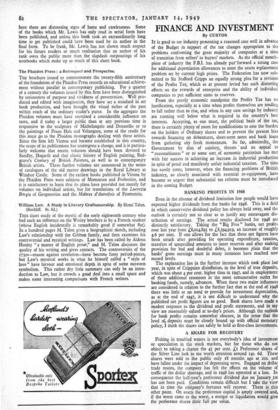FINANCE AND INVESTMENT
By CUSTOS
IT is good to see industry presenting a reasoned case well in advance of the Budget in support of the tax changes appropriate to the problems confronting the great majority of companies at a time of transition from sellers' to buyers' markets. As the official mouth- piece of industry the F.B.I. has already put" forward a strong case for additional depreciation allowances to meet the assets replacement problem set by current high prices. The Federation has now sub- mitted to Sir Stafford Cripps an equally strong plea for a revision of the Profits Tax, which as at present levied has such distorting effects on the rewards of enterprise and the ability of individual companies to put sufficient sums to reserves.
From the purely economic standpoint the Profits Tax has no justification, especially at a time when profits themselves are tending to fall rather than to rise, and when in any case savings by industry are running well below what is required in the country's best interests. Accepting, as one must, the political basis of the tax, there is certainly plenty of room for modifications to ease the burden on the holders of Ordinary shares and to prevent the present bias towards financing on debentures, short-term notes and bank loans from gathering any fresh momentum. So far, admittedly, the Government by dint of cajolery, threats ' and an appeal to " reasonableness " or to some sort of economic patriotism has met with fair success in achieving an increase in industrial production in spite of penal and manifestly unfair industrial taxation. The time has surely come, however, when the financing problems of British industry, so closely associated with essential re-equipment, have become so urgent that substantial tax reforms must be introduced in the coming Budget.
BANKING PROFITS IN 1948 Even in the absence of dividend limitation few people would have expected higher dividends from the banks for 1948. This is a field in which conservative dividend policy has always held sway, and the outlook is certainly not so clear as to justify any extravagant dis- tribution of earnings. The actual results disclosed for 1948 are distinctly satisfactory. Taking the "Big Five " banks, net profits rose last year from £8,014,893 to £8,394,919, an increase of roughly 4.6 per cent. If one allows for the fact that these net figures have been struck after providing for operating expenditure, taxation, transfers of u,nspecified amounts to inner reserves and after making provision for bad and doubtful debts, it becomes plain that the banks' gross earnings must in many instances have reached new record levels.
The explanation lies in the further increase which took place last year, in spite of Crippsian disinflation, in the level of true deposits, which was about 4 per cent, higher than in 1947, and in employment of these additional resources in the most remunerative outlet for banking funds, namely, advances. When these two major influences are considered in relation to the further fact that at the end of 1948 there was little or no need to provide for investment depreciation, as at the end of 1947, it is not difficult to understand why the published net profit figures are so good. Bank shares have made a modest response to the dividend and profit statements, and in my view are reasonably valued at to-day's prices. Although the outlook for bank profits remains somewhat obscure, in the sense that the level of, deposits must be closely bound up with official monetary policy, I think the shares can safely be held as first-class investments, A SHARE FOR RECOVERY
Fishing in troubled waters is not everybody's idea of investment or speculation in the stock markets, but for those who do not object to taking a chance the 42 per cent. Li Preference shares of the Silver Line look to me worth attention around 14s. 6d. These shares were sold to the public only 18 months ago at 21s. and have fallen under the impact of depressing news. Engaged on dollar trade routes, the company has felt the effects on the volume of traffic of the dollar shortage, and in 1948 has operated at a loss. In consequence the half-year's preference dividend due on January .1st has not been paid. Conditions remain difficult but I take the view that in time the company's fortunes will recover. There is this other point. On assets the preference capital is amply covered and, if the worst came to the worst, a merger or liquidation would give the preference shares their full par value.


































 Previous page
Previous page